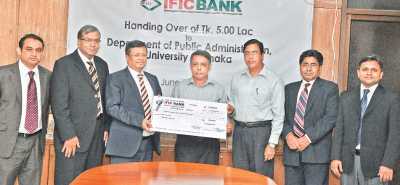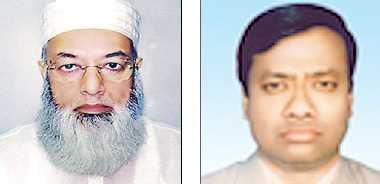Banking
Sonali, Janata cut lending rates
Two state-run banks -- Sonali and Janata -- have reduced their lending rates due to excess liquidity amid a poor demand for loans.
The interest rate for Sonali Bank's term loans came down by 1 percentage point to 14 percent, working capital loans by 2 percentage points to 14 percent and SME loans by 3.5 percentage points to 13 percent.
Janata Bank cut lending rates by 1 percentage point to 14 percent for its term loans.
The new interest rates that took effect yesterday will help attract customers, said Pradip Kumar Dutta, managing director of Sonali Bank.
“The interest rates were cut due to a poor demand for loans and idle liquidity in the bank,” Dutta said.
As on June 30, the bank has disbursed loans worth Tk 34,000 crore and collected deposits of Tk 66,000 crore, he said.
“Our filed-level officials have been given targets to increase loan disbursement,” he added.
SM Aminur Rahman, managing director of Janata Bank, said: “We decided to cut the interest rates due to excess liquidity. Our cost of fund is also low. We are offering 9.5 percent interest on deposits.”
However, Abul Barkat, chairman of Janata Bank, called for a single digit lending rate for the sake of massive industrialisation.
“If we want to set up big industrial units in the country, we should offer single digit interest rates,” Barkat said.
The cuts in lending rates by the state-owned banks will encourage private banks to do the same, said Salehuddin Ahmed, a former governor of Bangladesh Bank.
Political uncertainty, a scarcity of gas and electricity, and poor infrastructure are some of the reasons behind the declining demand for loans, Ahmed said.
The state banks should stop being dilatory while providing services to the general people, he said, adding that the banks should select potential borrowers, including SME entrepreneurs, to speed up loan disbursement.
“It is a good move by the state banks,” said Fahmida Akter Khatun, research director of Centre for Policy Dialogue.
She, however, said reducing the lending rates is not enough to boost investment. "We should ensure an investment-friendly environment and sufficient infrastructure.”
Palli Sanchay Bank edging closer to reality
The law for the bank passed in parliament
The parliament yesterday enacted the law for Palli Sanchay Bank, a specialised bank for rural poor along the lines of Grameen Bank.
The version of the act passed in parliament is more or less the same as the draft law approved by the cabinet last November.
Under the Palli Sanchay Act 2014, the new bank will emerge from the government's One House, One Farm project, just as Grameen Bank was born in 1983 following the conversion of Muhammad Yunus's Grameen Bank project in Jobra village near Chittagong University.
“This bank will give an institutional framework to save money for the beneficiaries of the One House, One Farm project,” Finance Minister AMA Muhith told the parliament, adding that the purpose of the bank is to mobilise the rural people's savings.
The government wanted to set up such a specialised bank as it has lots of experience in this area, Muhith said, recalling that he himself got the Grameen Bank Ordinance passed in 1983.
The government will hold 51 percent of the bank's ownership and the remaining 49 percent would go to the 17,300 cooperative societies of the One House, One Farm project.
The law said the bank's authorised capital would be Tk 1,000 crore and paid-up capital Tk 200 crore. The cooperative societies' total fund of Tk 1,342 crore would be transferred to the new bank.
The government can raise the paid-up and authorised capital through gazette notification and the bank's head office will be located in Dhaka.
The bank's board of directors will consist of 18 members, with the chairman to be selected by the government from the board members.
Of the total, seven directors will be selected from the shareholders from the division level associations of the One House, One Farm project, each represented by individuals.
The remaining 11 posts will include: a representative from the finance division, a member of the rural development and cooperatives division, director general of the Bangladesh Academy for Rural Development and the bank's managing director.
A representative from the legislative and parliamentary affairs division, two upazila chairmen selected by the government and four experts on rural economy and macro-financing, will also be present in the board.
Palli Sanchay Bank will not be governed under the Banking Companies Act, meaning it would remain mostly out of bounds of the central bank.
But like Grameen Bank, it would have to submit reports as per 'Bangladesh Banks demands and its audited reports would be presented to the government and BB at the end of each financial year.
The managing director can be appointed from the board or from outside, with BB's approval. He/she would be allowed to serve in the position until 65 years of age, in contrast to the maximum age of 60 for Grameen Bank's MD.
The activities of the specialised bank, in many aspects, would also resemble those of Grameen Bank. Like Grameen Bank, it will collect deposits and lend to its members.
The bank will provide small loans aiming to alleviate poverty and get the rural poor into the habit of saving.
The One House, One Farm is a project under the Annual Development Programme, the first phase of which started in 1997. The second phase of the project started after the present government assumed power.
IFIC Bank gives Tk 5 lakh to DU Public Admin Dept

IFIC Bank provided Tk 5 lakh to Department of Public Administration of Dhaka University on Monday to purchase computers for its library.
Shah A Sarwar, Managing Director and CEO of IFIC Bank Limited handed over the cheque to Dr. Musleh Uddin Ahmed, Chairman, Department of Public Administration at a function at the bank’s head office at Motijheel in Dhaka.
SIBL extends tenures of two vice-chairmen

Sayedur Rahman , Mohammad Azam
The tenures of Md. Sayedur Rahman and Mohammad Azam as vice-chairmen of Social Islami Bank Limited (SIBL) were extended.
The Board of Directors of SIBL in its 314th meeting unanimously extended their tenures, said a press release.
Md. Sayedur Rahman is a renowned and successful business personality of the country and a prominent garments sector entrepreneur. He is Managing Director of Lodestar Fashions Limited, Mid Asia Fashions Limited and Jessore Fisheries.
Rahman contributes a lot for the development of RMG and agricultural sectors of the country. He is also engaged in various social welfare activities of the country.
Mohammad Azam is a renowned businessman of Chittagong who has 27 years of experience in business arena. He is the proprietor of Zia & Brothers situated in Chittagong.
Banks, capital market closed today
There will be no public transactions at the scheduled banks today (Tuesday), the first day of fiscal year 2014-15.
Stock markets will also remain closed on the day, official sources said.
Banking source said that scheduled banks will open Tuesday, but all public transactions are not allowed just for the day. Talking to The Independent, a senior official of Bangladesh Bank, on the condition of anonymity said maximum bank officials will join their work station but they will be engaged in completing their pending works.



